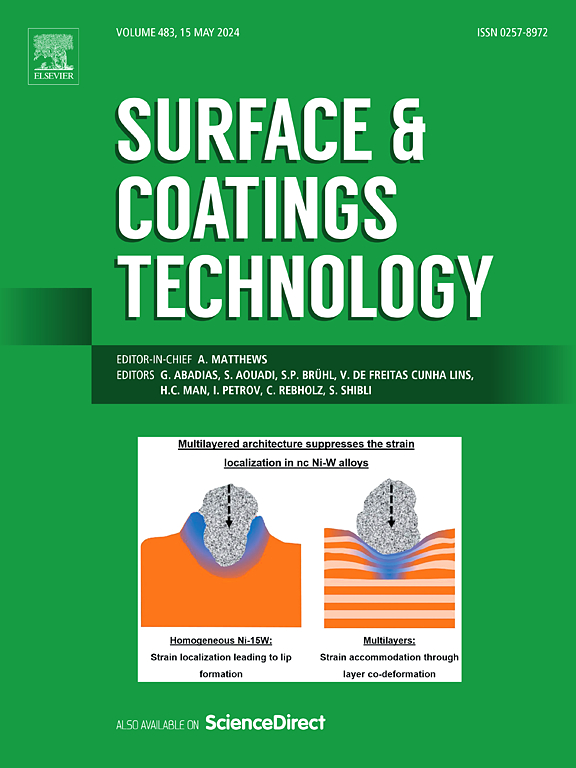Effect of high-repetition frequency nanosecond laser remelting on microstructure and oxidation properties of low-pressure plasma sprayed NiCoCrAlYTa coating
IF 5.3
2区 材料科学
Q1 MATERIALS SCIENCE, COATINGS & FILMS
引用次数: 0
Abstract
MCrAlYX coatings are widely utilized as bond coat in thermal barrier coating systems. This study employs high-repetition frequency nanosecond laser remelting (HRF-NLR) to enhance the resistance to high-temperature oxidation of NiCoCrAlYTa coatings prepared via low-pressure plasma spraying (LPPS). The objective of this study is to investigate how laser remelting influences the microstructural evolution of the NiCoCrAlYTa coating and the growth characteristics of the thermally grown oxide (TGO). Various scanning speeds and laser pulse energy densities were employed to investigate the microstates of the molten pool and the polishing mechanisms of the samples after HRF-NLR. Increasing the repetition frequency effectively mitigates the ablation issues typically associated with conventional laser remelting, while also enabling precise control over depth of the remelted coating. Microstructure analysis shows that the original rough surface was remelted and polished, contributing to a significant reduction in surface roughness, noticeable grain refinement, a high density of dislocations, and the redistribution of active elements within the modified coating. Oxidation results at 1150 °C reveal that the HRR-NLR coating can induce the formation of a dense, continuous, and slow-growing single α-Al2O3 film, demonstrating that HRF-NLR is an efficient and feasible method for improving the resistance of MCrAlYX coatings to high-temperature oxidation.
高重复频率纳秒激光重熔对低压等离子喷涂 NiCoCrAlYTa 涂层微观结构和氧化性能的影响
MCrAlYX 涂层在热障涂层系统中被广泛用作粘结涂层。本研究采用高重复频率纳秒激光重熔(HRF-NLR)来增强通过低压等离子喷涂(LPPS)制备的 NiCoCrAlYTa 涂层的抗高温氧化能力。本研究旨在探讨激光重熔如何影响 NiCoCrAlYTa 涂层的微观结构演变以及热生长氧化物 (TGO) 的生长特性。采用不同的扫描速度和激光脉冲能量密度来研究 HRF-NLR 后熔池的微观状态和样品的抛光机制。提高重复频率可有效缓解传统激光重熔通常存在的烧蚀问题,同时还能精确控制重熔涂层的深度。显微结构分析表明,原始粗糙表面经过重熔和抛光后,表面粗糙度显著降低,晶粒细化明显,位错密度高,活性元素在改性涂层内重新分布。1150 °C 下的氧化结果表明,HRR-NLR 涂层能诱导形成致密、连续和缓慢生长的单α-Al2O3 膜,证明 HRF-NLR 是提高 MCrAlYX 涂层耐高温氧化性的一种高效可行的方法。
本文章由计算机程序翻译,如有差异,请以英文原文为准。
求助全文
约1分钟内获得全文
求助全文
来源期刊

Surface & Coatings Technology
工程技术-材料科学:膜
CiteScore
10.00
自引率
11.10%
发文量
921
审稿时长
19 days
期刊介绍:
Surface and Coatings Technology is an international archival journal publishing scientific papers on significant developments in surface and interface engineering to modify and improve the surface properties of materials for protection in demanding contact conditions or aggressive environments, or for enhanced functional performance. Contributions range from original scientific articles concerned with fundamental and applied aspects of research or direct applications of metallic, inorganic, organic and composite coatings, to invited reviews of current technology in specific areas. Papers submitted to this journal are expected to be in line with the following aspects in processes, and properties/performance:
A. Processes: Physical and chemical vapour deposition techniques, thermal and plasma spraying, surface modification by directed energy techniques such as ion, electron and laser beams, thermo-chemical treatment, wet chemical and electrochemical processes such as plating, sol-gel coating, anodization, plasma electrolytic oxidation, etc., but excluding painting.
B. Properties/performance: friction performance, wear resistance (e.g., abrasion, erosion, fretting, etc), corrosion and oxidation resistance, thermal protection, diffusion resistance, hydrophilicity/hydrophobicity, and properties relevant to smart materials behaviour and enhanced multifunctional performance for environmental, energy and medical applications, but excluding device aspects.
 求助内容:
求助内容: 应助结果提醒方式:
应助结果提醒方式:


